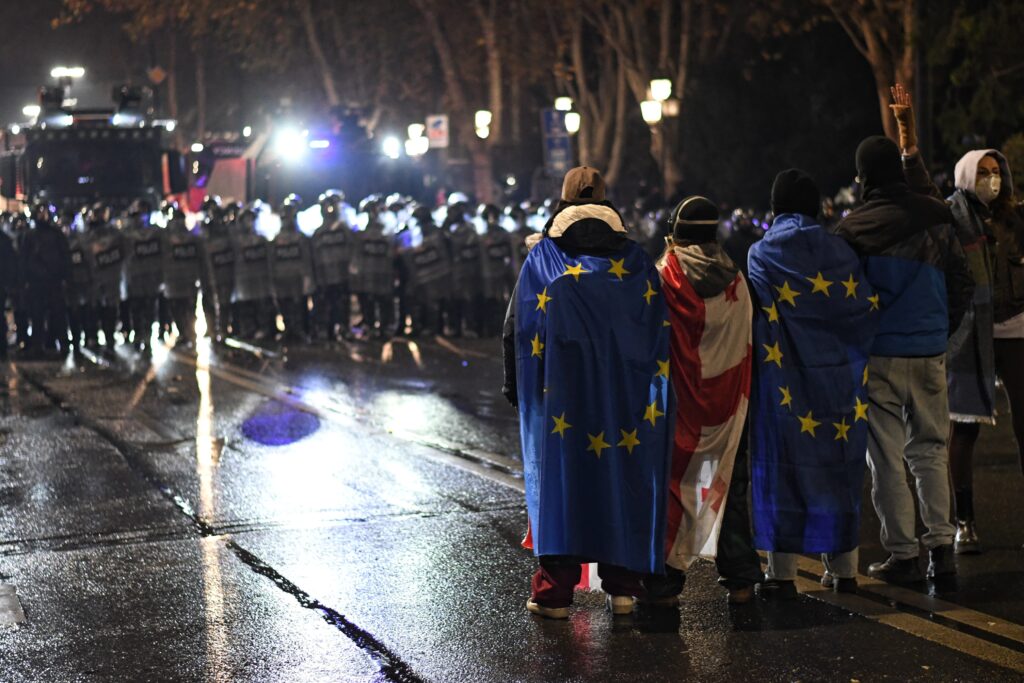Rustaveli Avenue, Tbilisi's main street, has been buzzing with people every night for the past two weeks. Brandishing European Union and Georgian flags, several thousand people have been gathering in front of the Parliament in Tbilisi.
Dressed in the traditional Cherkeska coats, equipped with whistles, lasers, and loudspeakers, they all demand an end to the pro-Russian regime of the Georgian Dream, new free and fair elections, and the release of arrested prisoners.
“Generations were born in free Georgia. What's happening now in Georgia is that people simply don't want to live in Russia,” says a young activist in front of the Parliament late at night, when the cold freezes your face.
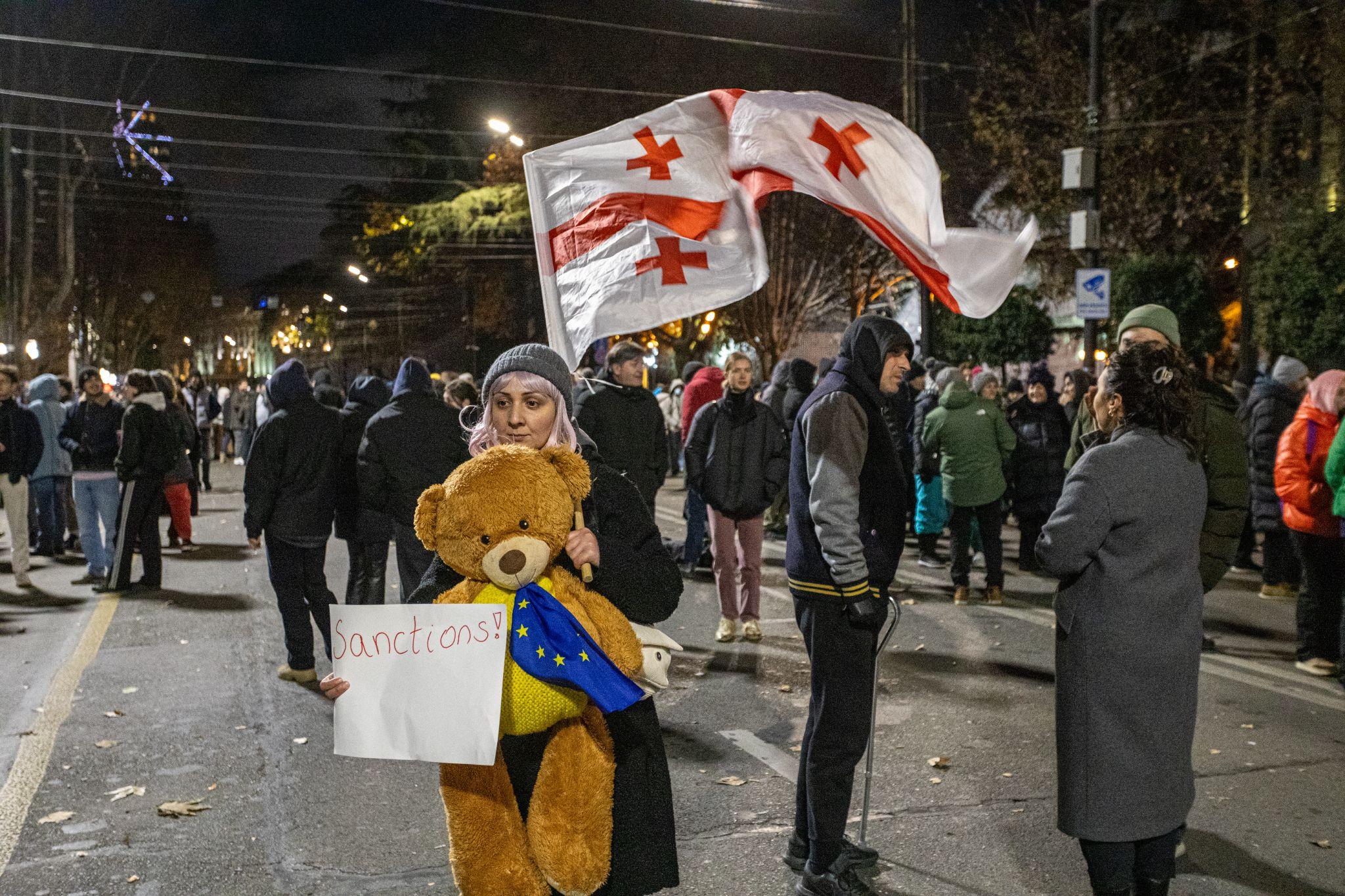
Gocha Gogsadze, a local activist, underscored the severity of the situation, stating, "There were many people—like civil servants—who went on strike. And Georgia is not like Azerbaijan or Iran. It does not have gas or oil. So it depends on the banking system and public services."
The strikes have galvanized a wave of community activism and grassroots efforts, with citizens taking matters into their own hands.
"The movement is learning from its mistakes from the spring protests. We started self-organising," Gogsadze explained. And this is very important. We have a Facebook group to support each other. We have crowdfunding and many things. And this helps us to be effective against this authoritarian regime."
During the protests, a notable spirit of solidarity emerged, with food being distributed freely to the protesters. This popular movement intensified in response to the ruling party's decision to suspend negotiations on accession to the European Union, following fraudulent parliamentary elections last October.
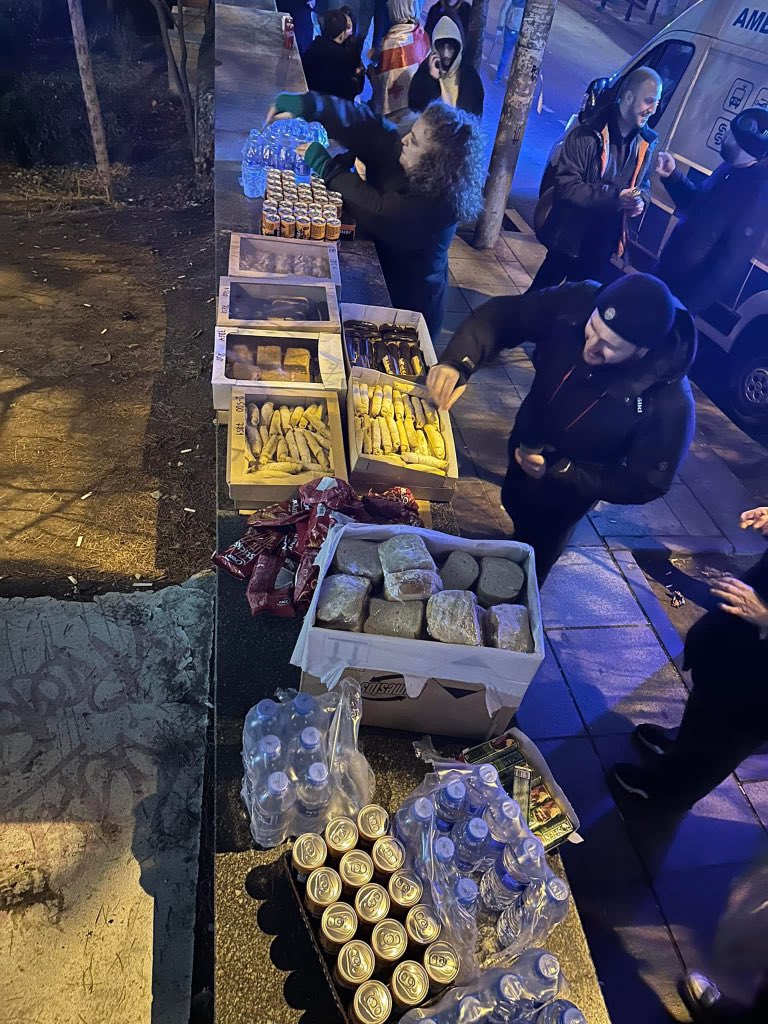
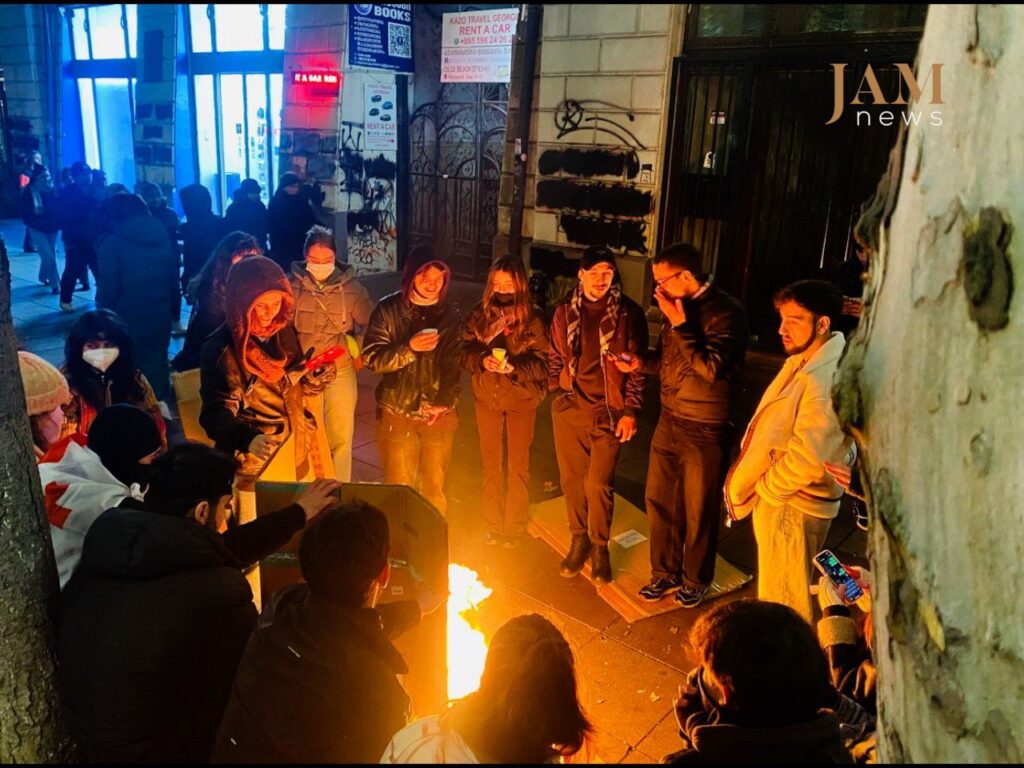
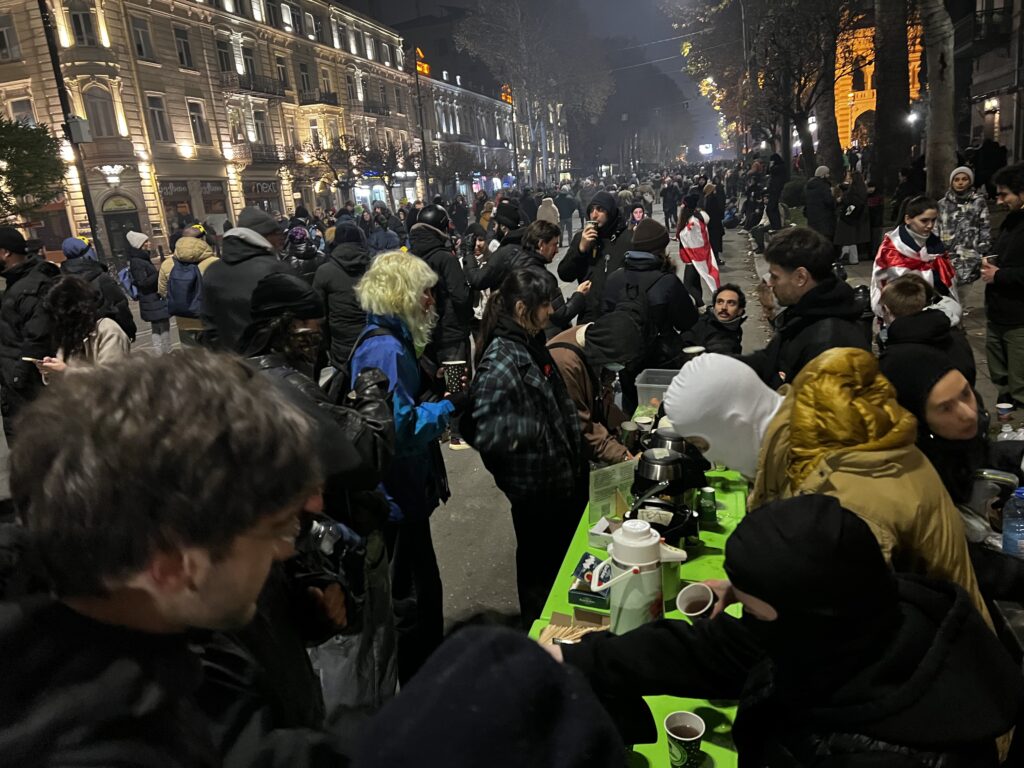
Today, a presidential election will reinforce the ruling Georgian Dream party's hold on power, accused by the protesters of steering Georgia away from its European path.
The pro-European President, Salome Zourabichvili, has pledged not to step down until free and fair elections have been held. The demonstrations and popular movement are gaining momentum across the country. More and more people of all ages are joining the movement.
Thousands take to the streets each night demanding EU accession and fair elections
In response, the Georgian Dream is stepping up repression against the movement and Georgian society. Multiple cases of police violence against demonstrators and journalists have been documented by NGOs and the opposition, repression denounced by the United States and Europeans, who have threatened to take retaliatory measures against the authorities. The pro-Russian Prime Minister Irakli Kobakhidzé described the demonstrators as “violent groups” controlled by a “liberal fascist” opposition, a term often used by the Kremlin to target its political opponents.
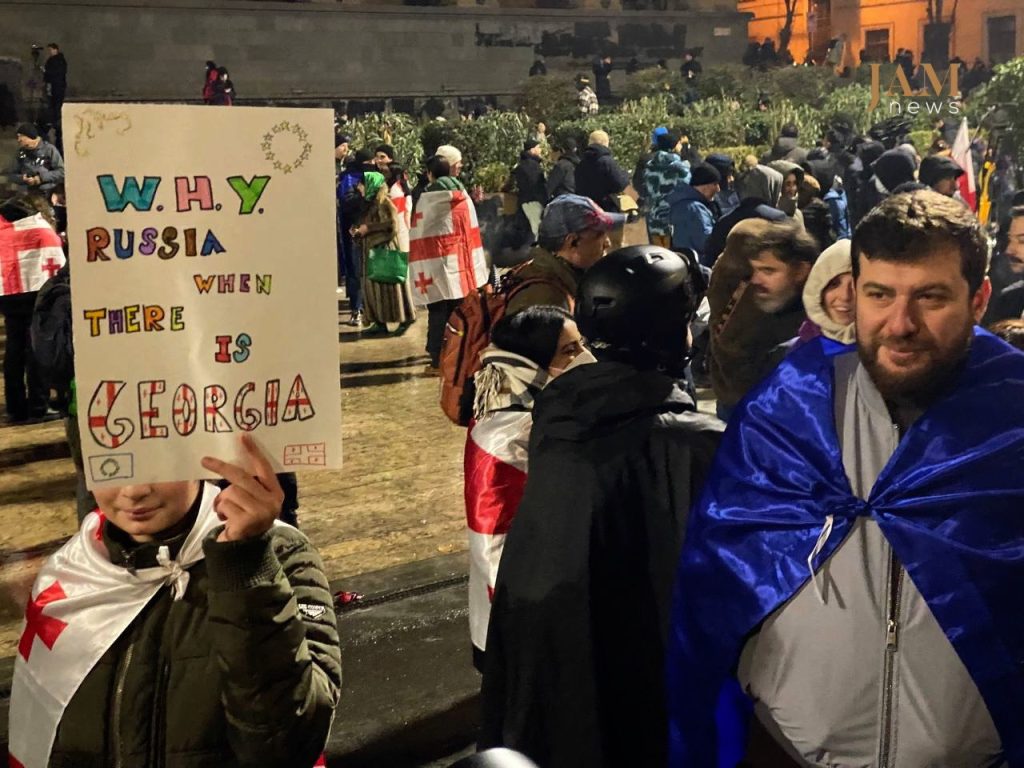
Police are using tear gas and water cannons on a massive scale to disperse the daily rallies, arresting more than 400 demonstrators, according to official figures since the movement began. On the night between 7-8 December alone, 107 protesters were arrested in a brutal crackdown by authorities. Among them was Giorgi Bregvadze, a student and part-time English teacher who was beaten up by the police and thrown into Georgian jails for 48 hours
Sitting in a café near the parliament, close to where his nightmare happened, Bregvadze recounts his experience. "I try to be an active citizen all the time," he says “I feel like I also have a responsibility to be active, to do my thing."
Bregvadze had just finished work at 22:00 and joined the protest when the police arrived. "I was literally just standing, and suddenly, four cops came to me," he recalls. "I was an easy target, I guess, because everybody was wearing black, and I was wearing a colourful jacket."
"One grabbed me by my throat, they spread my legs wide open, one grabbed my right leg, one grabbed my left leg, and they brought me uphill," Bregvadze says. "They pushed me against the building that is right in front of the parliament; they pushed me there, came to me, and started beating me up," he recalled, wincing.
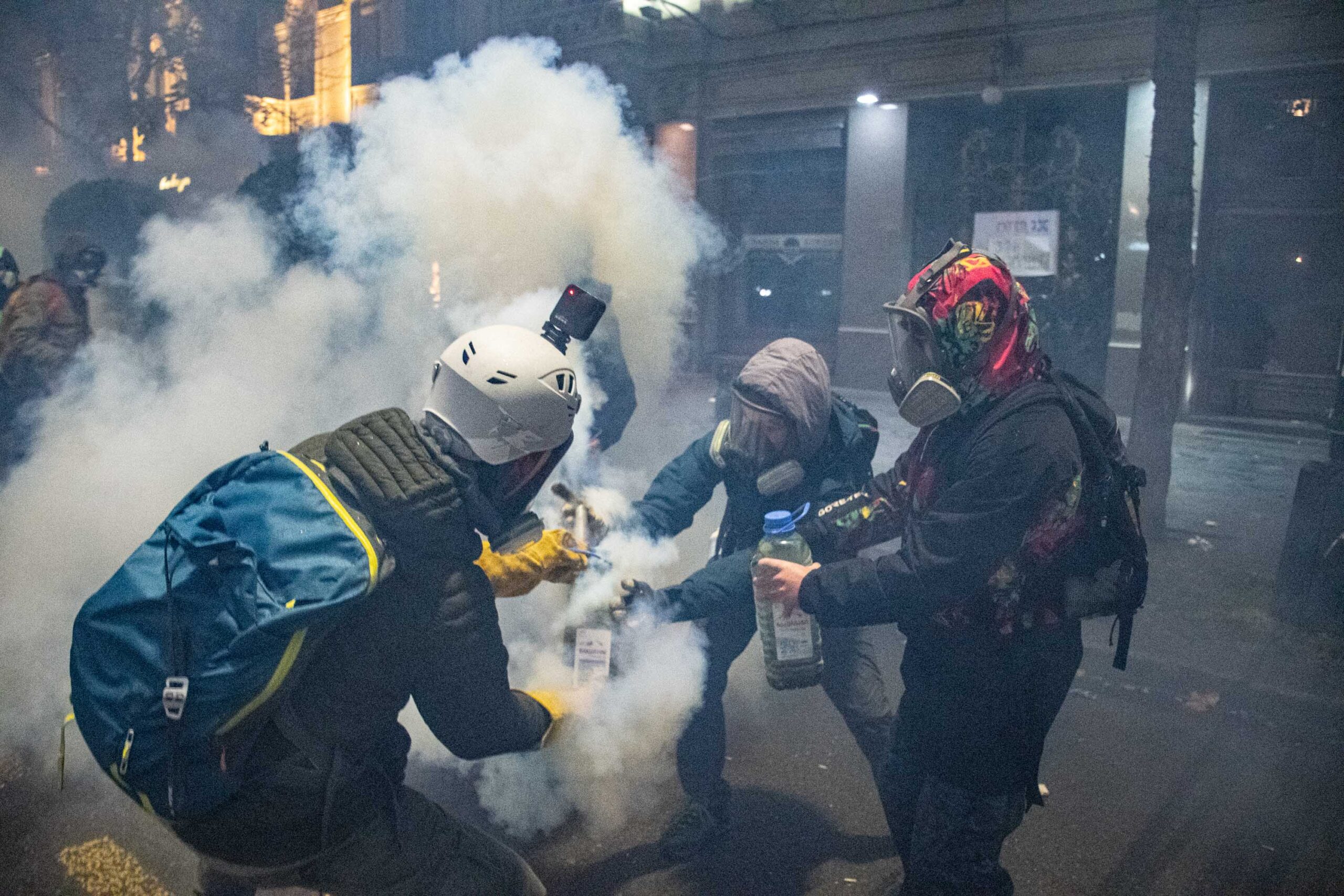
"Three cops were beating me up at the same time, and they were verbally abusing me too," he remembers. The situation was made even more terrifying by Bregvadze's recent septoplasty surgery, which made it difficult for him to breathe.
"The fist was coming at my chin, they banged my lip, and they took me to the police station," he says.“I was clearly shocked.”
At the police station, Bregvadze was held for an hour and a half. Then, he was transported to Sagarejo prison, 50 kilometers east of Tbilisi, where he spent 48 hours in isolation with no contact with the outside world.
"They were giving me one chunk of bread to eat all day, and just one bottle of water," Giorgi says. "We had one toilet, and one common bathroom that we all shared in the prison."
His cellmate was in an even worse state, desperately needing stitches for a head wound inflicted by the police.
Bregvadze's experience highlights the increasingly brutal treatment of protesters by authorities, who seem determined to crush dissent at any cost.
“No matter whether they arrest us, we do not consider ourselves as victims, we consider ourselves as freedom warriors,” he continued. “The people want to live in a democracy.”
The opposition Coalition for Change party in Georgia announced last Wednesday that its leader, Nika Gvaramia, had been detained by police. The party released a video on the social media platform X depicting Gvaramia being forcibly carried by the arms and legs down a set of steps by several men.
The footage, which has since gone viral, highlights one of the mechanisms allegedly employed by the regime to suppress dissent. This incident comes amidst growing tensions between the government and opposition parties, with the latter accusing the authorities of using heavy-handed tactics to stifle political opposition.
Police also raided the offices of the Youth Organisation of the opposition United National Movement (UNM) party. UNM in a statement accused the Georgian Dream government of launching “all-out terror and repressions against opponents.”
At the youth headquarters, the rooms were left ransacked, and many working documents were confiscated. “The police arrived. There were about a hundred of them. They searched everything, broke open doors, and pierced the ceilings They confiscated a lot of things like computers and even clothes. It was violent because when the activists were there, they tried to stop them,” explains a member of the UNM. “The five activists present during the search were arrested on the spot and taken to a detention center in the west of the country,” explains the opposition member..
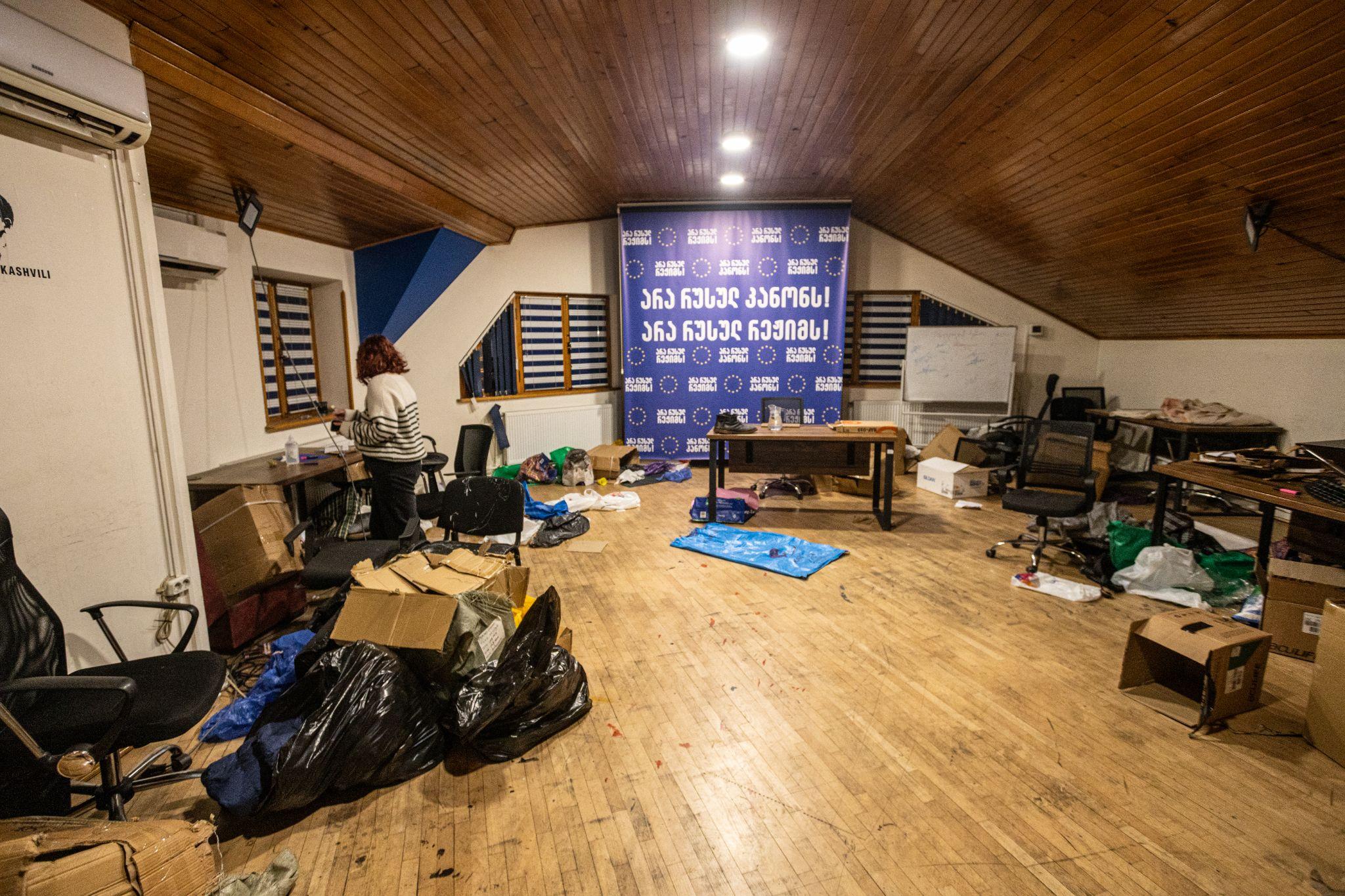 The offices of the UNM raided by security forces.
The offices of the UNM raided by security forces.
A video also shows the police officers, one of them going in the opposite direction, with what the UNM describes as false evidence. Activists think that the police planted microphones in the headquarters during the six hours of the raid.
A senior source within the party said that they often discuss if the “Belarusian scenario,” in which dictator Alyaksandr Lukashenka orchestrated a crackdown on the protests against falsified 2020 elections, jailing 65,000 people, is possible in Georgia. While the situation has “not yet escalated to the level of secret prisons,” the source warned that inaction could lead to such severe consequences.
The regime has increasingly resorted to employing Titushky, mercenary agents reminiscent of those who supported Ukrainian security services during the Maidan revolution. In response, protesters have begun organizing self-defense groups.
The government "crackdown squads" aka "titushky" deployed against #GeorgiaProtests participants target opposition media and politicians
— Euromaidan Press (@EuromaidanPress) December 7, 2024
Here they are seen attacking opposition politician Koba Khahadzi outside the office of @coalitionGEo (Coalition for Change)
🎥Security… pic.twitter.com/6MdephAUyJ
"It's a battle of nerves at this point," the high-ranking source admitted. "It's a matter of who can hold out the longest – us or them."
As tensions escalate, protesters have taken innovative measures to safeguard their movements and counter the growing threat posed by Titushky groups. Reconnaissance teams have been established to monitor police movements and identify the Titushky.
Gocha Gogsadze plays a role in these operations. "My job is to spot and recon," he explained. "We gather information while protesting. My friends and I go out onto the streets to locate Titushky or riot police, and we signal their positions through secure channels." This grassroots intelligence network has become vital for the protesters
"People feel that we are more protected now," Gogsadze thinks. "They believe we can come out more freely, that Titushky wouldn't attack us because we had bodyguards and strong men with us."
Even if "Titushky always attack first," Gogsadze noted. "They strike when it's night, under the cover of darkness when the streets are poorly lit." This tactic allows them to operate with impunity, often evading media attention.
Protesters of #GeorgiaProtests have self-organized to create anti-titushky defense groups
— Euromaidan Press (@EuromaidanPress) December 8, 2024
This follows attacks on opposition politicians, journalists, and activists by groups of regime thugs, aka titushky, acting in coordination with the police. Some think they are actually… https://t.co/5IspPGpfAA
“But we try to do our best with our auto-defence group, which allows us to outnumber the Titushhky,” Gogsadze said.
“In a chilling echo of Belarus in 2020, the current regime in Georgia is intensifying violence and repression to deter protesters demanding fair and equitable new elections and the resumption of EU accession negotiations,” analyses Frédéric Petit.
Petit, a French deputy and member of a coalition of MPs engaged in supporting Georgia, believes the regime is betting on European hesitation and the eventual turning of a blind eye by the European Union.
"The regime is counting on the Europeans' hesitations and the fact that the European Union will ultimately look the other way," Petit stated.
Beyond the recent protests in Georgia, many high-ranking officials from the administration, the Ministry of the Interior, Foreign Affairs, and Justice have resigned, refusing to continue serving the regime. This wave of resignations underscores the deepening crisis of legitimacy facing the government.
It is crucial to recall that the electoral fraud in Georgia was compounded by electoral lies. The ruling "Georgian Dream" party campaigned vigorously for EU membership, claiming to advocate for accession "with dignity and peace" to distinguish itself from the straightforward messages of its opponents. This strategy was calculated to appeal to a public where 80% of the Georgian population supported pro-European sentiments.
However, the dream took just over a week to shatter, as the government abruptly announced the suspension of the country's candidature procedures after claiming victory in a vote electoral analysts say was 15% falsified.
Related:
- Stolen election: how the Georgian Dream helped itself to 15% of all votes cast
- Pro-Russian party cements victory. Can Georgia’s revolution succeed?
- Georgian police admit possible chemical use in water cannons as protesters report tear gas symptoms
- Inside the police crackdown on Georgia’s pro-EU protests: a photo report
- “Not another Russian colony”: Georgia erupts against Moscow’s shadow rule

